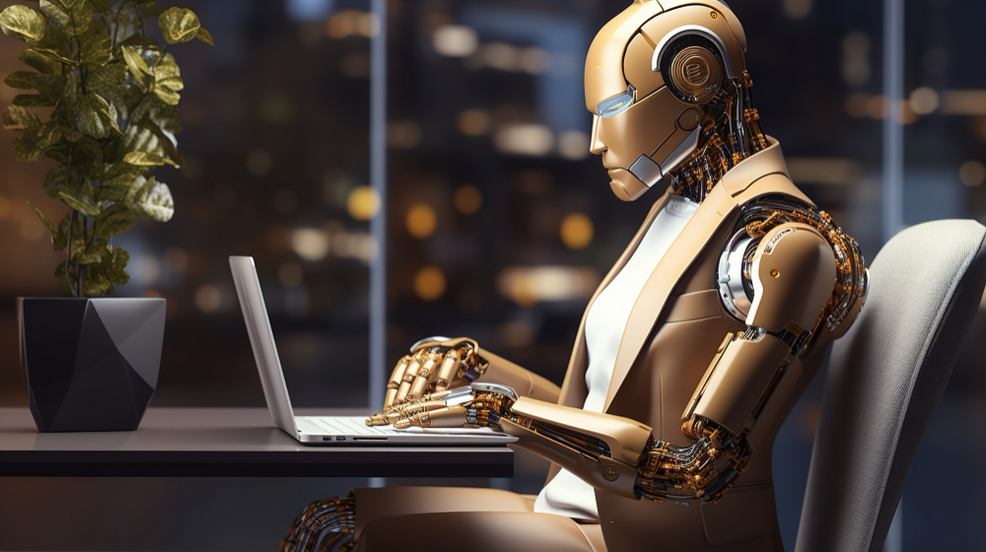As the role of AI in recruitment continues to grow, it’s clear we’re only at the starting point of what promises to be an exciting journey.
If you’ve searched for jobs in the recent past, chances are you’ve encountered artificial intelligence (AI) in the recruitment process. AI is revolutionizing recruitment and making a meaningful impact in the world of human resources. This evolution is enabling companies to streamline their hiring processes, reduce bias, and improve employee retaining rates. But what does AI mean for job seekers? How is it impacting employers? Here’s what you need to know.
Harnessing the power of AI in recruitment
In today’s digital recruitment landscape, many companies use advanced technology to streamline their hiring process. When you apply for a position and submit your CV with AI filtering, the information you provide is processed through a machine learning algorithm. Artificial Intelligence performs tasks like manually reviewing hundreds of resumes in mere seconds, sifting through candidates, and identifying potential matches based on data points. It saves valuable time and increases efficiency, allowing HR reps to focus on more critical aspects of recruiting.
Redefining talent acquisition
AI is reshaping how recruiters discover and engage with potential job candidates. Traditional recruitment involved a significant amount of time and effort scanning through countless resumes and profiles. AI-based sourcing tools, however, help recruiters tap into a broad talent pool by finding the right candidates within minutes. These tools build candidate profiles, score them based on their qualifications, and rank them according to relevancy. Additionally, AI enhances the candidate experience by enabling swift responses to queries and maintaining ongoing communication.
Reducing hiring bias
One critical challenge in recruitment is eliminating unconscious bias. AI helps address this issue by ensuring an objective evaluation of candidates. It eliminates the potential influence of factors like race, age, or gender that could sway a decision unfairly. By evaluating candidates solely on their qualifications and skills, AI leads to a more diverse workforce that accurately represents today’s multicultural society.
Improving retention rates
Artificial Intelligence isn’t only transforming how organizations recruit, but also how they retain talent. AI analytics help predict employee behaviors and identify factors that could trigger their departure. Consequently, employers can develop and implement retention strategies to ensure they maintain a satisfied and successful workforce.
Impact on job seekers
AI isn’t just revolutionizing the employer’s role in recruitment. It assists job seekers with finding roles more suited to their skills and potential. Automated job match systems suggest roles based on the seeker’s experience, background, and preferences. Additionally, AI-driven interview platforms allow job seekers to virtually showcase their skills, enabling a flexible and time-efficient interview process.
Preparing for the AI era
With AI holding such immense potential, it’s crucial to understand how to navigate this new landscape. Employers should start with developing knowledge of AI tools and platforms that can streamline their recruitment process. Conducting studies to determine the impacts of AI on recruitment efficiency and bias reduction is beneficial.
Job seekers, on the other hand, should acknowledge that they’re not interacting merely with human recruiters. They must optimize their resumes for algorithms, focusing on keywords relevant to the job. Engaging actively with AI, such as chatbots, during the job application process can also be advantageous.
The future of AI in recruitment
As we move further into the digital age, the utilization of AI in recruitment will only increase. The technology is set to continually evolve and make the hiring process more efficient and fair. Things like pre-screening video interviews using set questions and automated responses will be more common. AI chatbots may even replace initial human interaction in vetting job applicants.
In an economy where talent is a fundamental asset, AI is a game-changer. Both employers and job seekers benefit from its objective, rapid, and effective processes. However, constant vigilance is crucial in managing the potentially intrusive effects of AI, ensuring its ethical and responsible use in recruitment.
In conclusion, technology is rapidly redefining the field of recruitment, with AI at the forefront. Leveraging these powerful tools can spur companies’ progression, aid in acquiring the right talent, and ultimately, foster growth. To job seekers, AI offers an innovative, efficient navigation in their quest for the perfect job fit. As the role of AI in recruitment continues to grow, it’s clear we’re only at the starting point of what promises to be an exciting journey.

